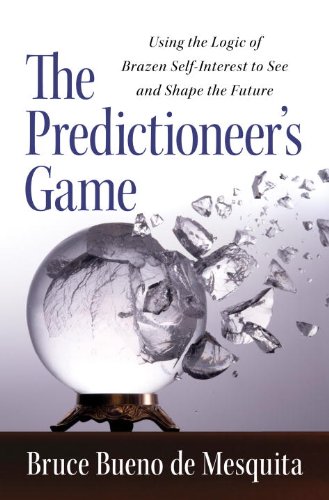
The Predictioneer's Game
Using the Logic of Brazen Self-Interest to See and Shape the Future
کتاب های مرتبط
- اطلاعات
- نقد و بررسی
- دیدگاه کاربران
نقد و بررسی

May 25, 2009
Mesquita (The Strategy of Campaigning
) purports to show how we can “predict... and engineer the future” with applied game theory in this provocative tutorial. Mesquita has spent 30 years refining his approach to “the science of predictioneering,” and claims a 90% accuracy rate for his mathematical model that predicts choices based on the self-interest of decision makers. Although he argues that “accurate prediction relies on science,” he cannot escape the reality that the numbers in his model are based on human, i.e., fallible, assumptions and estimates. The author admits to a few mistakes—he predicted that former first lady Hillary Clinton's health-care reform would become law—but blames any missteps on unforeseen events and uses his model to boldly predict that President Obama is unlikely to quash the terrorist influence in Pakistan and that global warming will prove immune to government prescriptions but will produce “its own solutions.” Mesquita claims perhaps too much for his game theory model, but his cogently argued and fascinating brief will appeal to anyone interested in complex national-security issues.

July 15, 2009
"Politics is predictable," proclaims theorist Bueno de Mesquita (Politics/New York Univ.) in a work that adds a new dimension to the phrase"gaming the system."
The author is a master of game theory, long used by mathematicians and economists to predict responses of"players" to various scenarios, and he claims—backed up by a"declassified CIA assessment"—a 90 percent accuracy rate in his use of that theory to predict political trends. Among his successes have been the forecast of the Tiananmen Square massacre and the Persian Gulf War well before the fact, drawing on a rather clinical but certainly effective view of human nature. About that point he is not bashful:"The view of people as cold, ruthless, and self-interested is at the heart of game-theory thinking," he writes."There may be room for nice guys, but not much. Most of the time, nice guys really do finish last." Cut a deal, political or economic, and our nasty inner Hobbesian beings emerge, which leads to certain predictable responses. Furthering the clinical bit, Bueno de Mesquita declares the likes of Adolf Hitler and Kim Jong Il to be not madmen but rational beings doing what dictators do to stay in power—requiring rational responses, that is, to check their damage."A question like'How can we get Kim Jong Il to behave better' is too vague," he writes."We need to define the objective more precisely, and we need to know the range of choices that Kim and his government can undertake." As the book progresses, the discussion becomes both more mathematically complex and more provocative. Bueno de Mesquita takes obvious pleasure, for instance, in twitting the Kyoto Protocol crowd as practically begging to be cheated on. Worth the price of admission, regardless of your view of the politics, is the author's brief primer on how to buy a car, which could just finish off the collapse of Detroit.
Fruitful reading that will make it difficult to look at the world through quite the same eyes as in one's virginal, pre–game theory days.
(COPYRIGHT (2009) KIRKUS REVIEWS/NIELSEN BUSINESS MEDIA, INC. ALL RIGHTS RESERVED.)

























دیدگاه کاربران